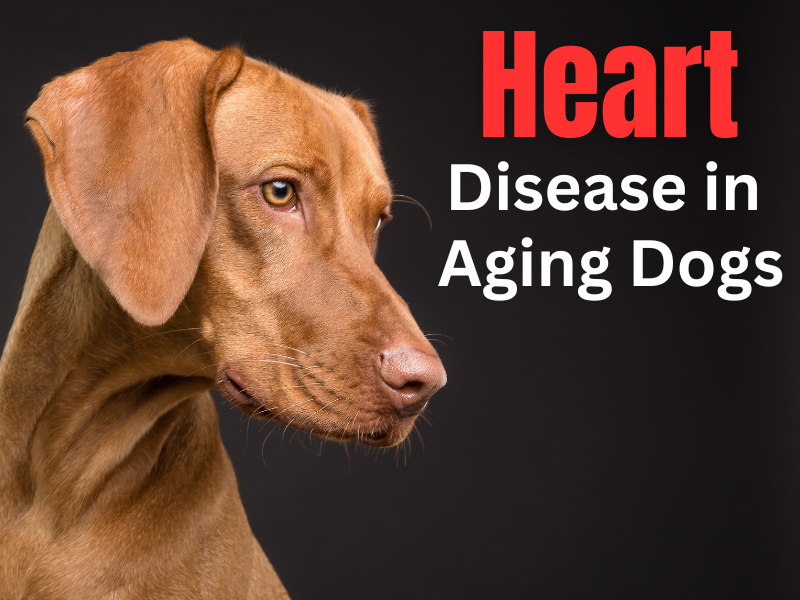
As our beloved dogs grow older, their health needs change, and heart disease becomes a common concern in senior dogs. Just like humans, dogs can develop a variety of heart conditions as they age. This article will explore what heart disease in senior dogs looks like, common symptoms to watch for, and how you can help manage and improve your dog’s quality of life.
What Causes Heart Disease in Senior Dogs?
Heart disease in dogs can be caused by a variety of factors, including:
- Genetics: Certain breeds, like Cavalier King Charles Spaniels and Doberman Pinschers, are genetically predisposed to heart conditions.
- Aging: As dogs age, the heart and its valves may weaken, leading to conditions like congestive heart failure (CHF).
- Obesity: Excess weight puts additional strain on a dog’s heart, increasing the risk of heart problems.
- Poor Diet: Diets lacking in essential nutrients can lead to heart complications, particularly if they are high in sodium.
Common Types of Heart Disease in Senior Dogs
There are several forms of heart disease that may affect senior dogs:
- Congestive Heart Failure (CHF): A condition where the heart is unable to pump blood efficiently, leading to fluid buildup in the lungs or abdomen.
- Heart Murmurs: An abnormal sound caused by turbulent blood flow in the heart. This can be a sign of valve disease, common in older dogs.
- Dilated Cardiomyopathy (DCM): The heart becomes enlarged and weak, leading to poor blood circulation.
- Mitral Valve Disease (MVD): One of the most common heart issues in small breeds, this condition affects the mitral valve, leading to heart failure if untreated.
Symptoms of Heart Disease in Senior Dogs
Knowing the signs of heart disease in older dogs is crucial for early intervention. Here are some common symptoms:
- Persistent coughing (especially at night or after exercise)
- Difficulty breathing or shortness of breath
- Fatigue or reluctance to exercise
- Fainting or collapsing
- Swollen abdomen due to fluid retention
- Weight loss or loss of appetite
- Restlessness at night
If you notice any of these symptoms in your senior dog, it’s important to visit your vet for a thorough examination.
Diagnosing Heart Disease
When diagnosing heart disease, your vet may use several tools to assess your dog’s heart health:
- Physical Examination: Listening to your dog’s heart with a stethoscope can help detect murmurs or irregular rhythms.
- X-rays: These can show the size and shape of the heart and whether there’s fluid buildup.
- Echocardiogram: An ultrasound that gives a detailed image of the heart’s structure and how well it’s functioning.
- Electrocardiogram (ECG): Measures the electrical activity of the heart and helps detect abnormal heart rhythms.
Treatment Options for Senior Dogs with Heart Disease
Managing heart disease in senior dogs requires a multi-faceted approach. While heart disease cannot be cured, early detection and proper care can greatly improve your dog’s quality of life. Here are some common treatments:
- Medications: Your vet may prescribe medications to help manage the symptoms of heart disease. These might include:
- Diuretics to reduce fluid buildup
- ACE inhibitors to lower blood pressure and reduce the heart’s workload
- Beta-blockers to manage heart rhythm
- Pimobendan, a medication that helps the heart pump more effectively
- Dietary Changes: Dogs with heart disease benefit from low-sodium diets. Your vet may recommend switching to a prescription food that supports heart health.
- Weight Management: Keeping your senior dog at a healthy weight reduces stress on their heart. Regular, low-impact exercise like short walks or swimming is beneficial.
- Regular Monitoring: Frequent vet visits to monitor your dog’s condition are essential. Adjustments to medication or lifestyle may be necessary over time.
Supporting Your Senior Dog at Home
Aside from medications and vet visits, there are ways you can make life easier for your dog:
- Comfortable Resting Area: Ensure your dog has a cozy, stress-free place to rest, especially if they have breathing difficulties.
- Controlled Exercise: Keep exercise light and stop if your dog shows signs of exhaustion or breathlessness. Short walks, rather than long runs, are ideal.
- Keep Calm: Stress and anxiety can exacerbate heart conditions. Try to maintain a calm environment and avoid stressful situations.
The Importance of Early Detection
The earlier you detect heart disease, the better your chances of managing it effectively. Regular vet checkups are essential for catching heart problems before they become severe. If your dog is prone to heart disease due to their breed or other factors, your vet may recommend more frequent monitoring as they age.
Final Thoughts
Heart disease in senior dogs is a serious but manageable condition. With proper treatment, lifestyle changes, and regular vet visits, many dogs with heart disease can live happy and comfortable lives. Always stay attentive to your senior dog’s behavior and consult your veterinarian if you notice any signs of heart problems. Proactive care can go a long way in ensuring your furry friend enjoys their golden years to the fullest.
